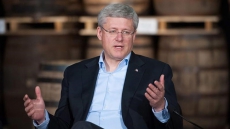TORONTO - The Nortel bankruptcy trial is nearing the finish line, with lawyers for competing groups that all want a chunk of the former tech company's assets focusing on a 10-year-old agreement on patents and other intellectual property.
Lawyers are looking at a 2004 agreement between the company's Canadian parent and several of its subsidiaries in the United States, United Kingdom and other countries where the company had operations.
Nortel's court appointed monitor argued Monday that the Canadian parent company owned the patents and other intellectual property and should receive all the proceeds from their sale under a court-supervised auction that added about $4.5 billion to the pool of money that will be eventually divided among Nortel's creditors.
That position is being opposed by U.S. bondholders who say the agreement effectively transferred beneficial ownership to the subsidiaries. The U.S. position is that much of the money from the sale of Nortel's patents and business operations should be allocated to the creditors of Nortel's U.S. business.
The U.K. creditors, which include British pensioners, also assert they have a claim from the patent auctions.
The decision rests with two judges who are presiding over the closing arguments Monday and Tuesday by video link in Toronto and Delaware.
Nortel pensioners and former employees have been watching the case since the trial began last May. Since the claims against Nortel are bigger than the money available to distribute, their hopes for recovering some of their retirement and health benefits hinge on how much money is allocated to the Canadian parent.
The trial is expected to determine how $7.3 billion of remaining Nortel assets are allocated among the various legal entities that are undergoing court-supervised wind ups in several jurisdictions.
At its height, Nortel was the most valuable company on the Toronto Stock Exchange and employed more than 90,000 people around the world.
The company filed for bankruptcy in 2009 in North America and Europe, shedding thousands of jobs. The company was hurt by changing market conditions, economic upheaval and an accounting scandal that sent its stock price plunging.





